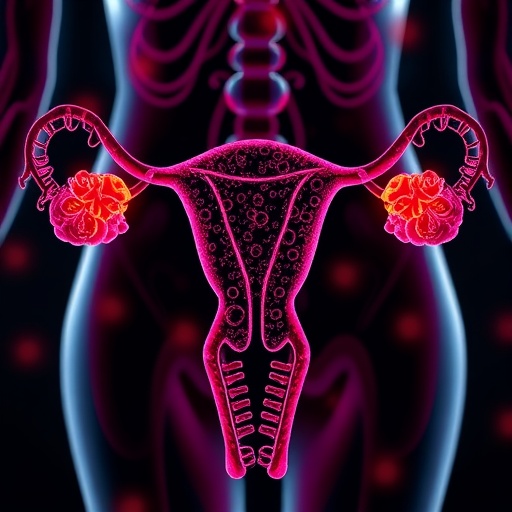In a groundbreaking study published in the journal Journal of Ovarian Research, researchers have unveiled the profound effects of nicotinamide mononucleotide (NMN) on ovarian function amidst the rigors of chemotherapy. This research addresses a critical concern for many women who face infertility as a consequence of cancer treatments, shedding light on potential therapeutic avenues that could protect ovarian health. With the increasing instances of cancer among women and the well-known detrimental effects of chemotherapy on fertility, the implications of this study cannot be overstated.
Nicotinamide mononucleotide, a derivative of vitamin B3, has gained attention in recent years for its potential benefits in promoting cellular health and longevity. As our understanding of cellular metabolism evolves, NMN emerges as a key player in the maintenance of cellular functions. This study specifically sought to explore NMN’s potential to safeguard ovarian function and enhance oocyte developmental competence during chemotherapy, a well-documented challenge in oncology.
The research team, led by Shen et al., conducted a series of meticulously designed experiments to investigate NMN’s effects on ovarian physiology. They utilized a robust animal model to simulate the conditions faced by women undergoing chemotherapy. By administering NMN in conjunction with chemotherapeutic agents, they observed significant protective effects that raise important questions about the mechanisms at play.
One of the pivotal aspects of this study is its exploration of the molecular pathways activated by NMN. The researchers hypothesized that NMN enhances the levels of nicotinamide adenine dinucleotide (NAD+), a crucial coenzyme involved in numerous biological processes, including DNA repair, energy metabolism, and apoptosis. As chemotherapy is known to induce significant oxidative stress and DNA damage, the potential for NMN to bolster DNA repair mechanisms is an alluring prospect.
In addition to offering protection against oxidative stress, the study examined NMN’s role in promoting follicular health and improving oocyte quality. The findings indicated that NMN administration led to an increase in the number of healthy follicles and improved maturation rates of oocytes, which is essential for successful fertilization and embryo development. This discovery could lead to new strategies for preserving fertility in women undergoing cancer treatment.
The implications of these findings extend beyond the laboratory, touching upon the lives of women affected by cancer. For many, the emotional toll of infertility can be as challenging as the disease itself. By potentially mitigating the negative impacts of chemotherapy on reproductive health, NMN could offer a beacon of hope for women seeking to conceive post-treatment. As discussions surrounding reproductive rights and cancer care progress, the intersection of fertility preservation and oncological treatment is becoming increasingly vital.
Furthermore, the research emphasizes the importance of personalized medicine in oncology. As the field moves toward more tailored approaches to cancer treatment, the use of adjunct therapies like NMN could become a staple in clinical practice. The availability of NMN as an over-the-counter supplement also raises questions about accessibility and patient empowerment in managing their health.
Despite the promising results, the study prompts a critical discussion regarding further research necessary to fully understand NMN’s role in human health. Clinical trials are essential for translating these findings from animal models to human applications. The path from laboratory discoveries to practical medical strategies is fraught with challenges, yet the enthusiasm surrounding NMN’s potential remains palpable.
The concept of fertility preservation has garnered increased attention, both within the scientific community and among the broader public. Women are becoming more informed and proactive about their reproductive health, and studies like the one undertaken by Shen et al. serve to illuminate the future of fertility preservation in oncology. With more research, we may uncover comprehensive strategies that integrate novel compounds like NMN into standard cancer care protocols.
As this study was published in 2025, it is imperative to monitor the evolving landscape of cancer treatments and fertility preservation solutions. Health organizations and researchers are likely to collaborate, fostering interdisciplinary dialogues that merge oncology, reproductive medicine, and nutritional science. By working together, we can formulate holistic approaches that holistically address the needs of cancer patients.
In conclusion, this significant research sheds light on a critical intersection of oncology and reproductive health. The protective effects of NMN against chemotherapy-induced ovarian damage represent a promising avenue for future investigation. As our understanding of cellular health and longevity grows, we stand on the cusp of potentially revolutionary advances in preserving fertility for women battling cancer. Continued exploration and rigorous clinical trials will be paramount in ensuring that these findings translate into meaningful clinical applications that enhance the quality of life for countless women.
In summary, the research conducted by Shen and colleagues offers a glimmer of optimism in the face of adversity, paving the way for new therapeutic interventions that could revolutionize the care of women undergoing cancer treatments. As we continue to learn more about the intricate connections between nutrition, cellular function, and overall health, the significance of compounds like NMN in protecting reproductive health becomes increasingly apparent. By fostering a deeper understanding of these relationships, we can hope to redefine the experience of cancer survivorship for future generations.
Subject of Research: The effects of nicotinamide mononucleotide on ovarian function and oocyte developmental competence during chemotherapy.
Article Title: Nicotinamide mononucleotide protects ovarian function and oocyte developmental competence during chemotherapy.
Article References:
Shen, L., Li, H., Gong, X. et al. Nicotinamide mononucleotide protects ovarian function and oocyte developmental competence during chemotherapy.
J Ovarian Res 18, 193 (2025). https://doi.org/10.1186/s13048-025-01782-4
Image Credits: AI Generated
DOI:
Keywords: NMN, ovarian function, chemotherapy, fertility preservation, cancer treatment, oocyte quality.




